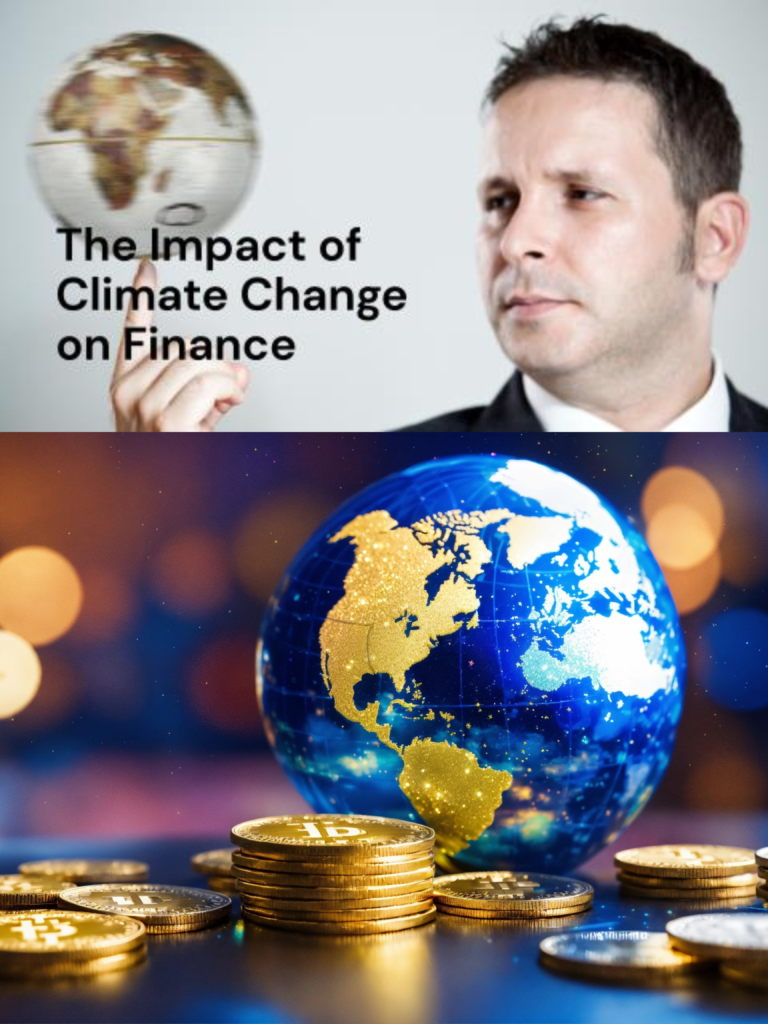Introduction
Climate change, an urgent global concern, casts a sweeping influence across our existence, penetrating into the heart of the finance industry. In the mosaic of challenges defining our era, climate change looms as a colossal force, permeating every facet of human existence, including the finance industry. In this blog post, let’s delve into the profound impact of climate change on finance, reshaping our perceptions of money and investments.

The Impact of Climate Change on the Finance Industry
Climate change is reshaping the finance industry in several significant ways:
Increased Risk of Natural Disasters:
The rising frequency and severity of natural disasters—floods, hurricanes, and wildfires—are exacerbated by climate change. These calamities wreak havoc on infrastructure, properties, and businesses, resulting in substantial financial losses for individuals and companies alike.
Changes in Investment Patterns:
Heightened awareness of climate change sparks a surge in demand for sustainable investments. Investors seek out companies committed to reducing carbon footprints, channeling funds into sustainable avenues, reshaping investment trends significantly.
Regulatory Changes:
Governments worldwide are taking proactive measures to combat climate change, spurring regulatory shifts. New regulations urge companies to prioritize sustainability, triggering operational and financial transformations.
Increased Demand for Green Finance:
The escalating global consciousness about climate change fuels a growing demand for green finance. This category encompasses financial products and services designed to promote sustainability. It includes green bonds financing environmentally-friendly projects, and green mortgages supporting energy-efficient homes.
Examples of Green Finance Initiatives: Impact of Climate Change
Green finance encompasses various instruments promoting sustainability:
1.Green Bonds: These bonds fund eco-friendly projects like renewable energy initiatives, energy efficiency enhancements, and sustainable land use.
2.Green Loans: Financial tools used to finance environmentally-friendly projects such as solar panel installations, energy-efficient home improvements, and electric vehicles.
3.Green Mortgages: Tailored mortgages financing energy-efficient homes, often offering lower interest rates and incentives to encourage eco-friendly investments.
4.Green Mutual Funds: Investment funds directed towards environmentally-friendly companies, adhering to strict environmental criteria for inclusion.
5.Green Credit Cards: Credit cards incentivizing eco-conscious purchases such as public transportation, organic food, and energy-efficient appliances.
Examples of Impact of Climate Change on the Finance Industry
Concrete examples showcase how climate change affects finance:
Insurance Companies: Vulnerable to climate change’s impact, insurance companies face increased payouts due to property damages from natural disasters, leading to higher costs and elevated risks.
Banks: With rising demand for sustainable investments, banks adapt their investment strategies while facing regulatory pressure to divest from environmentally harmful industries like fossil fuels.
Asset Managers: Responsible for client investments, asset managers recalibrate strategies to meet the surge in demand for sustainable investments. They also face mounting pressure to champion sustainability and reduce exposure to environmentally detrimental sectors.
Conclusion: Adapting Finance for a Sustainable Future
Climate change’s far-reaching influence significantly alters investment paradigms, amplifies regulatory pressures, and sparks a surge in demand for green finance. As global awareness continues to grow, these trends are expected to persist, necessitating the finance industry’s adaptation for sustained relevance and sustainability.
The confluence of climate change and the finance industry necessitates a proactive approach to mitigate risks and capitalize on opportunities. Adapting to the evolving regulatory landscape, integrating climate considerations into investment strategies, and fostering technological innovation will be pivotal in steering the finance industry toward sustainability. Collaborative efforts among governments, financial institutions, corporations, and investors are imperative to navigate the challenges and secure a resilient and prosperous financial future in the face of climate change.
In summary, climate change mandates a fundamental shift in the finance industry, steering it toward resilience and sustainability in an ever-evolving world.
Answer Covered People also ask
What is the relationship between climate change and finance?
What are the financial risks associated with climate change?
How does climate change affect the business industry?
How has industry affected climate change?
Disclaimer
This article has been created on the basis of internal data, information available publicly, and other reliable sources to be believed. The article may also include information which are the personal views/opinions of the authors. The information includes in this article is for general, educational, and awareness purposes only and is not a full disclosure of every material fact.
All the information on this website i.e. World Virtual CFO – is published in good faith and for general information purposes only. World Virtual CFO does not make any warranties about the completeness, reliability, and accuracy of this information. These are my views for only information purposes. Any action you take upon the information you find on this website (World Virtual CFO), is strictly at your own risk. World Virtual CFO will not be liable for any losses and/or damages in connection with using our website. For details please refer to our disclaimer page.
Dr. Dinesh Sharma is an award-winning CFO and AI strategist with over two decades of experience in financial leadership, digital transformation, and business optimization. As the founder of multiple niche platforms—including WorldVirtualCFO.com—he empowers professionals and organizations with strategic insights, system structuring, and innovative tools for sustainable growth. His blogs and e-books blend precision with vision, making complex financial and technological concepts accessible and actionable.